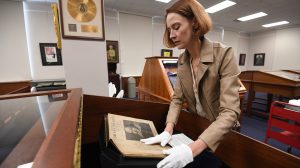Archives granted NEH preservation funds

Photo by Robert Jordan/Ole Miss Communications
Maintaining the proper conditions to preserve over 3,000 historical posters, maps, blueprints, broadsides and documents is a tremendous challenge, but the University of Mississippi Department of Archives and Special Collections received some help in the form of a $5,890 grant to protect its most fragile artifacts.
The National Endowment for the Humanities Preservation Assistance Grant will fund the purchase and installation of additional shelving and supplies for the storage, preservation and better organization of historical items in UM’s special collections. Those items include about 300 linear feet of archival materials such as posters, photos and other items that document Mississippi’s blues, films and state history.
Archives staff is grateful for the funds, said Jennifer Ford, associate professor and head of archives and special collections.
“This grant will allow us to properly house some of the most fragile pieces in our collection, safeguarding their preservation for years to come,” Ford said. “The funds will also help our staff make them more easily available to the public since they will be easier to retrieve.”
The NEH is an independent federal agency, which was organized in 1965. Its preservation assistance grants help small and mid-sized institutions such as libraries, museums, historical societies, archival repositories, cultural organizations, town and county records offices, and colleges and universities. The funds are designed to help preserve significant humanities collections of manuscripts, prints, photographs, moving images, sound recordings, and decorative and fine art objects.
Special funding is crucial for Special Collections, said Gail Herrera, assistant dean for technical services and automation and professor of library science.
“It is vital for the library to seek out grant opportunities in order to make its unique items accessible for students, faculty and the general public alike,” Herrera said.
UM Special Collections is made up of roughly 20,000 linear feet of archival material. It includes the blues archive, Southern media archive and the modern political archive. Manuscripts include some originals by William Faulkner, and some published and unpublished poetry and papers by Mississippi authors Larry Brown, Ellen Douglas, Barry Hannah, Beth Henley, Willie Morris, Tom Franklin and Beth Ann Fennelly.
Many documents and other items are from the civil rights movement. James Meredith, who in 1962 became the first black student to integrate the university and whose enrollment caused protesters to riot on campus, gave his collection of papers to the university in 1997. Papers by other prominent civil rights leaders are also in the collections, as well as documents from UM professors that deal with the integration of Ole Miss.
“The department’s collecting concentrates on Mississippi,” Ford said. “We have several different units: the blues archives, the literary collection, civil rights, Civil War, Mississippi politics and visual materials. Our collections, although they are specific, cover a tremendous variety of materials, and a number of them are oversized.”
The collection is vast but also fragile, Ford said. The photos, newspaper articles and concert posters are particularly vulnerable.
“You will find William Faulkner pieces that are oversized,” Ford said. “You’ll find blues posters from the 1950s onward that are oversized. These are fragile pieces. They were normally printed on acidic materials, and many did not survive as a result of this.”
